Jerome Parisse's Blog, page 11
May 26, 2011
The Next Three Days
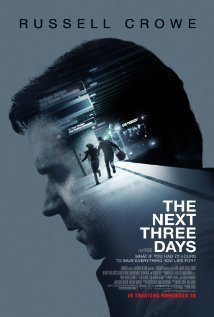 The Next Three Days is a 2010 movie directed by featuring , and . The story goes like this: After his wife is wrongly imprisoned for life for having supposedly murdered her boss, John Brennan (Crowe) decides to help her to break out from the prison so that they can start a new life elsewhere with their son. The plot is weak, with a few holes, and the acting is not particularly good. You won't get bored, as there is quite a bit of action, but it's not a movie to remember for more than a few hours…
The Next Three Days is a 2010 movie directed by featuring , and . The story goes like this: After his wife is wrongly imprisoned for life for having supposedly murdered her boss, John Brennan (Crowe) decides to help her to break out from the prison so that they can start a new life elsewhere with their son. The plot is weak, with a few holes, and the acting is not particularly good. You won't get bored, as there is quite a bit of action, but it's not a movie to remember for more than a few hours…
[image error]








May 25, 2011
My Sister's Keeper, by Jodi Picoult
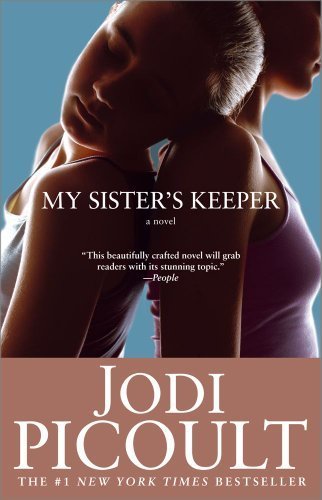 I normally don't read Jodi Picoult's novels, as all they seem to be doing is dissect a dysfunctional family or individual, ad nauseam. I should add that she does it quite well, though, and has millions of fans. I was keen on reading My Sister's Keeper, because it tackles a difficult topic, one that I am interested in, having worked for a few years for a rare disease patient organisation. My Sister's Keeper tells the story of Anna, a thirteen year old who was conceived artificially by her parents to be used as a genetically compatible donor for her sister Kate, who suffers from a rare form of leukemia. This is tricky. There are moral issues here, on top of the medical and psychological ones. But Anna has had enough. She has undergone multiple surgeries for her sister and she decides to take her parents to court to obtain medical emancipation – and to refuse to donate a kidney to her sister, the latest invasive surgery she is asked to undergo. This makes for a very interesting and controversial topic and I commend Picoult for choosing it. Unfortunately… there are too many flaws in the book. First, from a literary point of view, characterisation is too flimsy: I found that all the characters speak with the same voice. There are even similar speech patterns used by different characters. This does not work. It's even made worse by the fact that the story is told from many points of view – six at least – and I found myself confused more than once as to who was speaking. I had to go back to the chapter's title to know whose point of view it was. It also makes for too many unnecessary flashbacks. But the worst sin for me was Anna's voice, which is anything but a thirteen year old's. Okay, she is a mature child, but still, she speaks as if she has been studying philosophy for fifty years. She is able to analyse what people say, think and do, and she comes up with smart, complex, literary statements that do not ring true. There are also too many one-liners followed by space, such as at the end of a paragraph or chapter. This works for a while, but you quickly become annoyed with it. As for the plot, it lets the reader down towards the end. We spend 400 pages analysing difficult issues and asking hard questions, trying to find an answer, when nothing is black or white, right or wrong. Instead of having the guts to choose one, Picoult takes the easy way out – and the reader is left with no answer, no choice, absolutely nothing… It's an easy device,and it didn't need to be like that. I don't want to spoil the story for you so I will not say what it is about, but it is a shame that Picoult wasn't brave enough to just go with one choice or two – however imperfect - instead of fleeing the issue. Subplots are also miraculously solved and secondary characters are taken care of in the most improbable way… and as a consequence the novel loses its credibility at the very end. Such a shame…
I normally don't read Jodi Picoult's novels, as all they seem to be doing is dissect a dysfunctional family or individual, ad nauseam. I should add that she does it quite well, though, and has millions of fans. I was keen on reading My Sister's Keeper, because it tackles a difficult topic, one that I am interested in, having worked for a few years for a rare disease patient organisation. My Sister's Keeper tells the story of Anna, a thirteen year old who was conceived artificially by her parents to be used as a genetically compatible donor for her sister Kate, who suffers from a rare form of leukemia. This is tricky. There are moral issues here, on top of the medical and psychological ones. But Anna has had enough. She has undergone multiple surgeries for her sister and she decides to take her parents to court to obtain medical emancipation – and to refuse to donate a kidney to her sister, the latest invasive surgery she is asked to undergo. This makes for a very interesting and controversial topic and I commend Picoult for choosing it. Unfortunately… there are too many flaws in the book. First, from a literary point of view, characterisation is too flimsy: I found that all the characters speak with the same voice. There are even similar speech patterns used by different characters. This does not work. It's even made worse by the fact that the story is told from many points of view – six at least – and I found myself confused more than once as to who was speaking. I had to go back to the chapter's title to know whose point of view it was. It also makes for too many unnecessary flashbacks. But the worst sin for me was Anna's voice, which is anything but a thirteen year old's. Okay, she is a mature child, but still, she speaks as if she has been studying philosophy for fifty years. She is able to analyse what people say, think and do, and she comes up with smart, complex, literary statements that do not ring true. There are also too many one-liners followed by space, such as at the end of a paragraph or chapter. This works for a while, but you quickly become annoyed with it. As for the plot, it lets the reader down towards the end. We spend 400 pages analysing difficult issues and asking hard questions, trying to find an answer, when nothing is black or white, right or wrong. Instead of having the guts to choose one, Picoult takes the easy way out – and the reader is left with no answer, no choice, absolutely nothing… It's an easy device,and it didn't need to be like that. I don't want to spoil the story for you so I will not say what it is about, but it is a shame that Picoult wasn't brave enough to just go with one choice or two – however imperfect - instead of fleeing the issue. Subplots are also miraculously solved and secondary characters are taken care of in the most improbable way… and as a consequence the novel loses its credibility at the very end. Such a shame…








May 24, 2011
Besta MT-7000, Chinese-English electronic dictionary and e-tutor
 I have finally received my Besta MT-7000! It took me a few weeks to find it. I tried to order it from China and Singapore, but the stocks of the sites that offered it were wrong and after a few unsuccessful attempts I was back to square one. I ended up ordering it on Amazon. The Besta MT-7000 is the best electronic Chinese-English dictionary on the market (This is strictly my point of view.). And it's not very expensive. I should start by saying that it is much more than an electronic dictionary, as it features lessons ranging from characters to pronunciation, daily and business conversations, and a list of tools from a diary to a calculator, games etc. I love the fact that you can either use a keyboard or write directly on the digital screen with a small pen to look for a word or a character. You can even write sentences and the Besta will translate them for you! I have been playing with it non-stop since it arrived, and I am taking it with me on my business trip to Sydney next week. It replaces many books that I have been schlepping around for a few months. Being small, you can carry it in your pocket and use it whenever the need arises. I highly recommend it to anyone learning (Mandarin) Chinese.
I have finally received my Besta MT-7000! It took me a few weeks to find it. I tried to order it from China and Singapore, but the stocks of the sites that offered it were wrong and after a few unsuccessful attempts I was back to square one. I ended up ordering it on Amazon. The Besta MT-7000 is the best electronic Chinese-English dictionary on the market (This is strictly my point of view.). And it's not very expensive. I should start by saying that it is much more than an electronic dictionary, as it features lessons ranging from characters to pronunciation, daily and business conversations, and a list of tools from a diary to a calculator, games etc. I love the fact that you can either use a keyboard or write directly on the digital screen with a small pen to look for a word or a character. You can even write sentences and the Besta will translate them for you! I have been playing with it non-stop since it arrived, and I am taking it with me on my business trip to Sydney next week. It replaces many books that I have been schlepping around for a few months. Being small, you can carry it in your pocket and use it whenever the need arises. I highly recommend it to anyone learning (Mandarin) Chinese.








May 23, 2011
Rabbit Hole
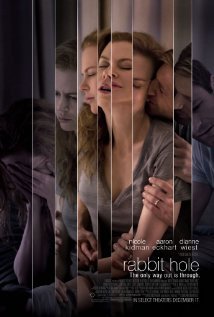 I first saw Rabbit Hole as the famous play by , which won the 2007 Pullitzer Prize for Drama. In fact I saw the Australian premiere in Sydney at the Ensemble Theatre a few years back. It's a great play, sad and funny at the same time, and tackling a difficult subject, the grieving process of a couple who have lost their only son, run over by a car in front of their house. Lindsay-Abaire's writing is subtle, yet powerful, and never in-your-face. I loved it.
I first saw Rabbit Hole as the famous play by , which won the 2007 Pullitzer Prize for Drama. In fact I saw the Australian premiere in Sydney at the Ensemble Theatre a few years back. It's a great play, sad and funny at the same time, and tackling a difficult subject, the grieving process of a couple who have lost their only son, run over by a car in front of their house. Lindsay-Abaire's writing is subtle, yet powerful, and never in-your-face. I loved it.
I have just now watched the 2010 movie version of the play, directed by , and with and in the main roles. It is good as well – Kidman does a great job I find – but it lacks some of the good (read: funny) moments of the play, which lightened the atmosphere. Those moments are essentially those where Becca's (Kidman's) sister appears – I adored her character. The play and the movie are different, and having seen the play first did not make the movie any better or worse. It's just two sides of the same story. And a good one.
Movie trailer:

And a video about the Australian premiere at the Ensemble Theatre:









May 22, 2011
COCORICO
I've been meaning to write a few words about COCORICO, a show that I went to see a few weeks ago, and which was part of Le French May Arts Festival here in Hong Kong. It is a duet made of two Frenchmen, Patrice Thibaud, a hilarious physical comedian, and Philippe Leygnac, an amazing musician. The show is in mime and with music. I hadn't laughed that much in a long time. Thibaud is an expert at making you understand a situation with only a few gestures, and at making you scream with laughter at the same time. As for Leygnac, he is a genius – just visualise him playing the piano while his compadre keeps pushing the piano left, right and back, and you will understand what I mean. The show can be seen by people of all ages – in fact, children should rush to see it, I can guarantee you they will love it as much as adults do. Judging by the number of encore and the duration of the applause at the end, the audience lapped it up. The show is made of a series of tableaux, all linked by one element. It lasts about an hour and a half. I still haven't got over the surprise created by Leygnac jumping out of a suitcase that had been standing at my feet for a few minutes. Ten stars!








May 21, 2011
Magical Halong Bay
 I grabbed the opportunity that I was in Hanoi (Vietnam) last week to visit Halong Bay, a place that was high on my list of travels to do… and I wasn't disappointed. Most people see the bay in fog, which seems to be the average weather there, but we were lucky enough to see it under various lights. The first day was indeed foggy, which created a magical atmosphere. The sun came out the second day, and we jumped into the turquoise waters to spend hours swimming, canoeing and snorkelling (It seems to be a rare enough occurrence, so we were ecstatic). On our third, and last, day, it rained a little and our junk even had to shelter behind a small island to avoid a gale! Our cruise was fabulous, and with only ten people on board, we felt privileged. Most people seem to choose a two-day cruise that includes the visit of the famous caves, but we found that three days gave us the possibility to swim and canoe at length in areas that are far from any tourists, so I would advise anyone to choose this option. The second day was definitely the highlight of our trip.
I grabbed the opportunity that I was in Hanoi (Vietnam) last week to visit Halong Bay, a place that was high on my list of travels to do… and I wasn't disappointed. Most people see the bay in fog, which seems to be the average weather there, but we were lucky enough to see it under various lights. The first day was indeed foggy, which created a magical atmosphere. The sun came out the second day, and we jumped into the turquoise waters to spend hours swimming, canoeing and snorkelling (It seems to be a rare enough occurrence, so we were ecstatic). On our third, and last, day, it rained a little and our junk even had to shelter behind a small island to avoid a gale! Our cruise was fabulous, and with only ten people on board, we felt privileged. Most people seem to choose a two-day cruise that includes the visit of the famous caves, but we found that three days gave us the possibility to swim and canoe at length in areas that are far from any tourists, so I would advise anyone to choose this option. The second day was definitely the highlight of our trip.








May 20, 2011
Derek Clendening: The Between Years
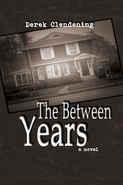 Hi Derek, could you please describe yourself in five words?
Hi Derek, could you please describe yourself in five words?
Dork who writes every day.
What can you tell us about The Between Years?
The book focuses on Randy Fuller who has separated from his wife because the grief of losing their 6 month old baby boy Kenny is too great. Basically, Randy wants to have another child right away and Carol isn't ready. Therefore Randy moves into his ancestral home, a Victorian house along the Niagara River. While there, he sees the ghost of his son at age four one night, then age eight, twelve and eighteen on the succeeding nights. He realizes that Kenny is growing up rapidly in the walls, which forces Randy to face realities of parenthood that he had never considered.
It's an emotionally charged book that has no good guys or bad guys. The characters are people who are presented in all their frailty and imperfections. I leave it to the reader's best judgment as to who is right and wrong in this book.
Who's your favourite author?
I have several: Stephen King, Rio Youers, John Langan and Richard B Wright.
Do you have tips for budding writers?
Sure. My advice is to write (and read) every day. Writers get asked that all the time and they will always give some variation of that answer, but it's the truth. Here's why: writers need discipline and they must hone their skills. You can't take shortcuts. Also, novels—or projects of any length, really—cannot be finished if they're not being paid proper attention. A writer must strap themselves into their chair and write constantly. We all lead busy lives but serious writers will always find a way to write every day.
What are you working on now?
Right now I'm finishing a zombie novel, tentatively titled The Breeding. I'm also outlining a sequel to The Vampire Way, my young adult novel.
Where can we find you online?
Why right here, my good man: http://thehorrorofderekclendening.blogspot.com/
Thanks, Derek!








May 19, 2011
Bangkok cabs… and more
Three weeks ago I was in Bangkok for the weekend. I love that city! So much to do, so much to see, so many fantastic people to meet… The Thais are not afraid of using colours, and their taxis are a vibrant proof of it.
And if you thought it was only superficial… just have a look INSIDE those cabs…
Another exciting feature of Bangkok is some of its inhabitants, which you can meet in many parks…
Finally, I don't usually advertise for bars and restaurants, but if you spend time in Bangkok, Vertigo is a must. It is a bar and restaurant, located on top of the Banyan Tree Hotel, at 61 floors high! I've heard the restaurant is on the expensive side, but a drink there will be enough to give you something to remember for a long time… To be honest I was not totally at ease, especially with what I found to be small fences around the place (It would be easy to jump off), but the view is amazing. Check it out!








May 3, 2011
Two Rules for Creative Writing, by Michael R. Collings
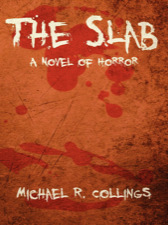 Michael R. Collings is a Professor Emeritus of English from Pepperdine University. Since retiring a few years ago, he has republished all of his earlier books, plus seven novels, volumes of poetry (mainstream, science fiction, fantasy, and horror), and literary studies of writers from Milton to Clive Barker. In total, he has about 35 books currently in print with three publishers. In this great article written specially for alivewithwords.com, he tells us about his process for writing The Slab, and shares with us two rules for creative writing. Read on, it's fun and interesting!
Michael R. Collings is a Professor Emeritus of English from Pepperdine University. Since retiring a few years ago, he has republished all of his earlier books, plus seven novels, volumes of poetry (mainstream, science fiction, fantasy, and horror), and literary studies of writers from Milton to Clive Barker. In total, he has about 35 books currently in print with three publishers. In this great article written specially for alivewithwords.com, he tells us about his process for writing The Slab, and shares with us two rules for creative writing. Read on, it's fun and interesting!
Rule 1: Write about what you know. A frequently quoted if rather basic rule almost every writer will encounter. And usually it works fairly well.
But what about those of us who write horror? There are few who claim to be on a first-name basis with the werewolf, or the vampire, or the zombie, or the ghost that figures so prominently in the story we want to tell. And those who do make the claim…well, perhaps the less said about them the better.
When I sat down to begin work on what would ultimately become The Slab, some twenty-odd years ago, I followed Rule #1 as closely as possible. I chose a subject I knew well—the house we had bought around 1980 (and lived in, however unhappily, for the next quarter century). We had not been the proud owners of our first home for more than six months when we began making discoveries.
First, the people who sold us the house had assiduously gone through it from top to bottom, spackling and repainting and touching up the ceilings to hide the fact that there were serious cracks in every room in the house. The back wall of the master bedroom dropped nearly two inches as the summer wore on and the soil dried out, until we could literally—and I mean literally—see daylight between the wall and the ceiling.
Then, when I had to peel the living room carpet away from the sliding patio doors for some reason, we discovered that there was a crack between the slab and the wall that extended from the corner of the kitchen through the living room and on through two bedrooms to the far rear corner. It was wide enough that I could put my hand in it, and deep enough that I could feel the damp dirt underneath the foundations. And it provided a handy highway-getaway for roaches and other vermin…including a rat that used it as a runway for a long while, until we were able to build concrete blocks between each room and finally capture the critter.
Then we found out the cause of all of our woes: the contractor who build the development some twenty years earlier had been a thief and a crook. He had the nasty habit of laying down rebar for foundation slabs, getting it approved by the city inspector…then pulling it up, pouring the concrete without any, and laying it in the next house, thereby saving a ton of money. He also skimped on the wiring, we found out many years later—there was no single piece of wiring anywhere in the house that was longer than three feet, and the scraps he had joined with plastic caps were of whatever gauge and material he happened to have handy. When he was found out shortly after the development was finished, he hanged himself. And by the time we bought the death-tr…the house, all of the insurance companies had ceased to honor any claims.
So we were stuck with it.
That might not have been so bad, except that a few years after we moved in, I developed severe tinnitus in both ears, along with incremental deafness, and—since I knew little or nothing about tinnitus at that time—I figured that I was merely going crazy. The sounds—hiss, crack, boom, ring-ring-ring, scrape—kept me awake day and night…and everywhere I looked there were cracks in the walls! When I went to someone to see if they could help me handle the constant ringing, I was sent to a psychiatrist…who diagnosed clinical depression. And everywhere I looked there were cracks in the walls!
And I won't even mention the four years that the roof leaked despite efforts to patch and re-finish. We finally had to rip the entire roof off—discovering to no surprise that the plywood used was only ¼" thick instead of the requisite ¾" for our area—before the water stopped.
Now, when I was awake all night, all I could see were the cracks in the walls and all I could hear was the sound of water running running running.
So there I sat: clinically depressed, half-deaf but with extreme hypersensitivity to low, bass sounds, constantly distracted by internal sounds, living in a house that seemed about to fall apart at any moment (and knowing that I could never sell it because, after all, who would want to buy a place as badly constructed as that one was), struggling to keep up with my teaching assignments when I could no longer hear my students or concentrate enough to read and grade their papers.
And there was Rule #1: Write about what you know.
I wrote the novel in segments, out of chronological or narrative order. The first episode was the one with the roaches in the living room and kitchen. I think I wrote it the next day.
But then I was faced with a dilemma.
If this was going to be a horror novel—and I knew it was—I would need more than just a few cockroaches.
That was when I remembered the next rule.
Rule #2: Put your character into true jeopardy and then, when it looks like he (or she) is about to escape…Make your character's life a living hell!
That was also when writing The Slab became part-therapy, part-escapism, part-revenge.
We had found a handful of cockroaches in the living room…what if there were hundreds! Our roof leaked in drips and spurts into one of the bedrooms…what if the whole back yard flooded! Our house was badly constructed and—even though it had already stood for two decades and would probably stand for two or three more—looked like it was about to fall apart…what if the house itself were evil!
I didn't finish the manuscript of the novel. Things became too difficult physically and mentally as my hearing deteriorated until I needed hearing aids in both ears. Then I developed cataracts in both eyes twenty years earlier than my doctor would have expected. And the depression deepened. And life at school became less and less bearable as I had to resign from committees that before I had enjoyed, endure hours-long faculty meetings without understanding anything anyone said, and refuse to even answer my telephone because I could not interpret what I might hear.
Finally, about five years ago, things reached a crisis point. I had a long discussion with the Dean of my college, and we decided to part company amicably. In fact, he went out of his way to make my retirement easy and the transition smooth. For which I am eternally grateful.
A couple of years after my wife and I moved to Idaho, I pulled out the ms. of The Slab—about 30,000 words.
And I remembered those two rules:
#1: Write about what you know; and
#2: When things start looking up, make your character's life a living Hell.
Enough time had passed for me to be objective about the house. Mur daughter and son-in-law had purchased it, knowing full well what it was like (she had, after all, spent most of her life living there), raised it three feet, tore out the old foundations, and replaced it with a new slab…one with rebar. On top of it, they reconstructed the house, making it into a showplace.
My hearing and tinnitus were still problems, but the depression was under control. So in I jumped.
It was almost a pleasure destroying the contractor who build the house in my novel…almost. And giving the people who disguised all of the problems just to make a quick sale a truly terrible time. And what to us had been minor irritations (I know realize) became to my characters life-threatening and sanity-threatening moments of true horror.
The Slab is doing fairly well. For a while last week, it broke into the top 1% of sales at the Kindle store, so apparently what I have to say about the potential horrors of homeownership has resonated with a few readers. And I know that the act of turning 30,000 words of disjointed episodes into a 90,000-word novel probably did me more good than all of the therapy combined.
So…my advice to anyone wanting to become a horror novelist?
Remember two rules:
#1: Write about what you know, and
#2: When things start looking up, make your character's life a living Hell.
Oh, and one more rule I almost forgot….
#3: Have fun while you do it!








April 28, 2011
Casey Calouette: "The Little Black Gas Book"
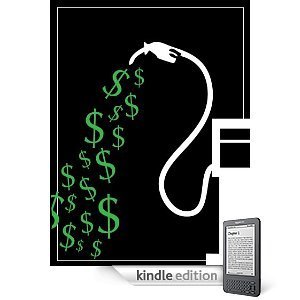 Hello Casey, could you please describe yourself in five words?
Hello Casey, could you please describe yourself in five words?
Fragmented engineer with a cause.
What can you tell us about "The Little Black Gas Book"?
Back in 2008 during the height of the financial crisis I was working on ways that I could try to save a few bucks on gas, which was becoming increasingly expensive. What I found online was a wealth of knowledge, though fragmented, so I began to compile it and review it with an engineers eye and found a good deal of it to be nonsense, junk, lies, and outright fraud.
As my list grew I thought other people could get some use, and hopefully enjoyment out of it. It began as something to point out what worked to save you money on gas but turned into a bit of economic theory on the pricing of gas, what does work and to what extent and my favorite chapter on what doesn't work. It was really entertaining to see the junk science that some people tried to sell others with no regard for the science.
The key idea at the center of the book is to know how much gas you are using. If you become aware of your usage you will reduce it. A medical study was done on weight loss and proved that if you tracked your caloric intake you ate less food, so why couldn't that hold true for fuel usage? I tested it myself and was quite stunned at how much gas I used, and I thought I was careful!
Later in the book I got into the alternative fuels and where they stand today along with potential fuels for the future. There is some really exciting technologies at work right now and it's going to be interesting to see which technologies end up lasting and which go away.
Who's your favourite author?
Matt Taibbi has been getting a lot of my reading time lately. He tells it like it us and isn't afraid to pull any punches. For someone who covers Political stories he is refreshingly honest, not taking a side but pointing out stupidity, fraud, and lies. It's nice to get someone to tell it to you straight these days.
Do you have tips for budding writers?
Write, read and know your subject. If you don't write none of the other points matter. If you don't read you won't learn from others. There are tricks in prose and style that you become aware of once you start writing that you don't notice as a reader. Knowing your subject guarantees you won't sound like a fraud. Try to BS your way through a story and the reader will know.
Also know your style, if you sound too strange you become an oddity but if you sound like everyone else you become a commodity. Striking that balance is what makes for a fresh, unique story.
What are you working on now?
A collection of outdoor short stories based on fly fishing, kayaking and the outdoors. After technology my love is for the outdoors so I've decided to spend some time writing fiction in that genre. I also found that nonfiction doesn't generate the buzz or readability that fiction does so I'm going to step out of my Engineer writing shoes and putting my fishing waders on for some inspiration.
Where can we find you online?
My primary haunt is at http://www.geektechnologist.com








Jerome Parisse's Blog
- Jerome Parisse's profile
- 25 followers

















